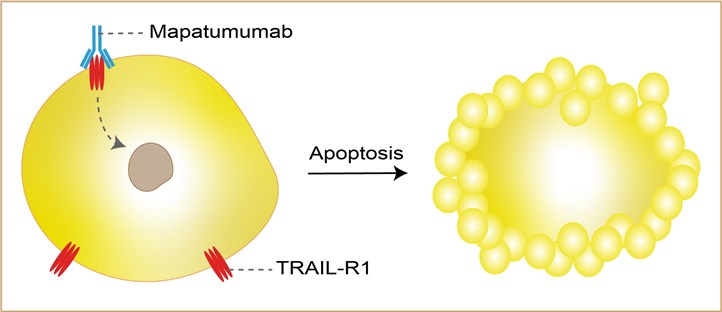

Mapatumumab Overview
Introduction of Mapatumumab
Mapatumumab (formerly HGS-ETR1) is fully human agonistic monoclonal antibody (mAb) undergoing clinical trials for the treatment of cancer. It targets the human tumor necrosis factor-related apoptosis-inducing ligand (TRAIL) receptors 1 (TRAIL-R1, also known as DR4) which is expressed on the surface of many tumor cell types. This monoclonal antibody was discovered by Cambridge Antibody Technology, now AstraZeneca, and Human Genome Sciences, now GlaxoSmithKline, as a result of the collaboration between the two companies in 1999 in exploitation of CAT's phage display technology. Early work by the two companies indicated that mapatumumab induced cell death in multiple tumor types both in vitro and in vivo. Besides, it was applied in the clinical trials of advanced solid tumors, non-Hodgkin's lymphoma, advanced non-small-cell lung cancer (NSCLC) and advanced colorectal cancer.
Mechanism of Action of Mapatumumab
Because apoptosis is a physiologic death culminating in fragmentation of cells cleared by phagocytosis, inflammatory reaction or tissue scarring usually does not occur. Defects in apoptosis can prolong cellular lifespan and contribute to neoplastic cell expansion and can create a permissive environment for genetic instability that can contribute significantly to carcinogenesis. Apoptosis is triggered by two major pathways: the death receptor–induced extrinsic pathway and the mitochondrial–mediated intrinsic pathway. The extrinsic pathway activates procaspase-8. Once activated, this initiator caspase can activate effector caspases, such as caspase-3, caspase-6, and caspase-7, which in turn cleave a variety of substrates to give rise to DNA degradation and characteristic morphologic changes. Recombinant members of the tumor necrosis factor family, including Fas ligand, tumor necrosis factor, and tumor necrosis factor–related apoptosis-inducing ligand (TRAIL) can induce apoptosis in preclinical models. TRAIL was identified in 1995 and is a type II membrane protein that can be cleaved from the cell surface to form a soluble ligand capable of inducing apoptosis in a wide variety of cancer cell lines. TRAIL can bind to five different receptors, including four membrane-bound and one soluble receptor. Two of these membrane receptors, TRAIL-R1 (death receptor 4) and TRAIL-R2 (death receptor 5) have a cytoplasmic death domain through which TRAIL can transmit its apoptotic signal by binding as a homotrimer. Interestingly, the apoptotic activity of TRAIL appears selective for cancer cell lines with minimal activity against normal cell types. Agonistic TRAIL-R1 and TRAIL-R2 antibodies may have greater therapeutic potential than TRAIL due to a prolonged half-life in vivo and lack of interaction with so-called “decoy” TRAIL receptors. Mapatumumab (TRM-1, HGS-ETR1) is a fully human monoclonal antibody that functions like the natural receptor ligand-TRAIL and is agonistic to TRAIL-R1 with very high specificity and affinity. Mapatumumab was able to induce apoptosis in multiple tumor cell lines representing various tumor types. Treatment with various concentrations of mapatumumab resulted in a dose-dependent reduction of cell viability preceded by activation of caspase-3 and/or caspase-7 in most cell lines. Mapatumumab was also shown to enhance chemotherapeutic agent activity in vitro and reduced the growth of human tumors in xenograft models, including preestablished colon, lung, and kidney xenograft models.
 Fig 1. Mechanism of Action of Mapatumumab
Fig 1. Mechanism of Action of Mapatumumab
What We Provide
Therapeutic Antibody
Mapatumumab
We provide high-quality Mapatumumab for use in WB, FC, IP, ELISA, Neut, FuncS, IF and most other immunological methods. For lab research use only, not for diagnostic, therapeutic or any in vivo human use.
For research use only. Not intended for any clinical use.
This site is protected by reCAPTCHA and the Google Privacy Policy and Terms of Service apply.

